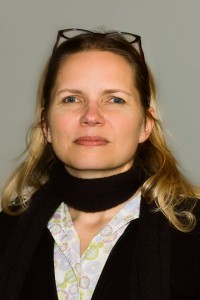 On first glance, Christina Kraenzle’s journey from doctoral student in the University of Toronto’s Graduate Program in German Literature, Culture, and Theory to her current position as Associate Professor of German Studies at York University merely involved crossing the 401 – the eight-lane provincial highway that traverses north Toronto. But, of course, the path to a secure
job was paved with years of hard work as she sought to expand her teaching portfolio. While completing her dissertation, Kraenzle took on a limited term appointment at nearby Trent University, one at U of T, and in the next year, one at York University that was advertised to become tenure-track in the following year. She recalls the stress of December 2003, when she was slated to defend her dissertation and also had an interview for the advertised York position the same week: “I think the interview was on a Friday and the defense the following Monday, and final marks were due either on the interview or defense day!” Needless to say, Kraenzle passed both her defense and the interview with flying colors (and submitted her marks on time!). She maintains that, given her extensive teaching experience before joining York, the biggest adjustment from graduate school was coming to terms with the large amount of committee work and service that increasingly consume faculty schedules, at least within the Humanities.
On first glance, Christina Kraenzle’s journey from doctoral student in the University of Toronto’s Graduate Program in German Literature, Culture, and Theory to her current position as Associate Professor of German Studies at York University merely involved crossing the 401 – the eight-lane provincial highway that traverses north Toronto. But, of course, the path to a secure
job was paved with years of hard work as she sought to expand her teaching portfolio. While completing her dissertation, Kraenzle took on a limited term appointment at nearby Trent University, one at U of T, and in the next year, one at York University that was advertised to become tenure-track in the following year. She recalls the stress of December 2003, when she was slated to defend her dissertation and also had an interview for the advertised York position the same week: “I think the interview was on a Friday and the defense the following Monday, and final marks were due either on the interview or defense day!” Needless to say, Kraenzle passed both her defense and the interview with flying colors (and submitted her marks on time!). She maintains that, given her extensive teaching experience before joining York, the biggest adjustment from graduate school was coming to terms with the large amount of committee work and service that increasingly consume faculty schedules, at least within the Humanities.
Kraenzle secured tenure at York over a year ago, and in August 2011 also became Director of York’s DAAD-funded Canadian Centre for German and European Studies (CCGES). One of the first projects that she is now tasked to oversee is the upcoming workshop “Models of Mobility: Systematic Differences, Path Dependencies, Economic, Social and Environmental Impact (1900 to tomorrow),”
which will take place at York in March 2012 and is co-organized with Matthias Kipping at the Schulich School of Business and Christina Lubinksi at the German Historical Institute, Washington. The event will bring together sociologists, economists, urban planners, historians, geographers, cultural studies scholars from Europe, North America and Japan to investigate how various actors, e.g. industry, users and policy-makers, have shaped systems of transportation. It will also examine the extent to which these models have created path dependencies in terms of technology, physical infrastructure and cultural preferences that limit subsequent choices and, last but not least, will assess the economic, social and environmental impact of these different models of mobility in the past and today. Parallel to this event there will also be a roundtable workshop on “Future Models of Urban Mobility” hosted by the German Consulate in Toronto, with panelists drawn from representatives of industry, government, and urban
planning.
The conference topic dovetails with Kraenzle’s own research pursuits. Her dissertation thesis with Professor John Noyes had focused on contemporary travel literature, with an eye towards transnational German cultural production and issues of mobility. She really appreciated the way Noyes permitted her to take the topic in new directions that intrigued her, as the discipline of German Studies was going through profound changes and rethinking the boundaries of Europe and of cultural production as a transnational enterprise. Today, her research continues in this vein, both with research on history and memory in contemporary German language travel writing and on women’s Reisereportage from the 1920s and 30s. Her advice to current graduate students:
“Love your topic, because you’ll be working on it for quite some time beyond graduate school during its journey into a book in your early professional career!”
|